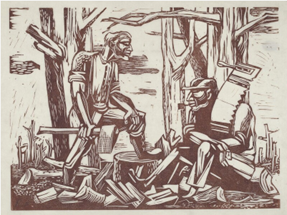Industry News
New AD/CVD Petitions on High Purity Dissolving Pulp from Brazil and Norway
TweetAug. 15, 2025
By:
Austin J. Eighan
On August 12, a domestic producer of high purity dissolving pulp (HPDP) and a labor union requested the U.S. Department of Commerce and the U.S. International Trade Commission (ITC) initiate antidumping (AD) duty investigations on imports of Brazilian and Norwegian HPDP, as well as countervailing (CVD) duty investigations on Brazilian HPDP.

HPDP is a specialized cellulose product produced by using chemical pulping methods to break down hardwoods (e.g., maple, birch, eucalyptus), softwoods (e.g., pine, spruce), or a blend of both, and remove nearly all non-cellulose components. The result is a white, odorless sheet composed of over 90% alpha-cellulose with very low hemicellulose and lignin content. HPDP is typically sold in dry rolls or bales for use in downstream products such as cellulose esters, microcrystalline cellulose, and cellulose-based films.
The petitioners assert that “subject imports have consistently undersold the domestic industry’s [average unit values],” capturing a dominant share of the market. For example, between July 2024 and June 2025, imports of HPDP from Brazil and Norway accounted for 82.2% and 9.1%, respectively. As a result, they contend that “[w]ithout relief …. foreign producers, already armed with excess capacity and with capacity expansion projects underway, will continue to increase exports to the US market at unfairly traded prices.”
The proposed scope of the investigations covers merchandise meeting the following description:
The merchandise subject to this investigation is high purity dissolving pulp (“HPDP”), which is a dissolving pulp with an alpha cellulose percentage of 90 percent by weight or higher on an oven dry basis, as calculated by: alpha cellulose percentage = (100-S10) + 0.5*(S10-S18) where S10 and S18 values are determined by International Organization for Standardization (“ISO”) 692:1982, and having a brightness level of 90 percent or higher, as measured by ISO 2470-1:2016. HPDP may be derived from any virgin or recycled cellulose fiber source (including, but not limited to, those sourced from hardwoods, softwoods, woody crops, agricultural crops/byproducts/residue, and agricultural/industrial/other waste). HPDP may be produced from a chemical pulping process including without limitation a kraft (sulfate) pulping and/or sulfite pulping process.
HPDP can be shipped in any form, including, but not limited to, a liquid slurry or in any dried form such as flakes, powder, granules, pellets, shreds, rolls and sheets.
The scope includes merchandise matching the above description that has been finished, packaged, or otherwise processed in a third country, including but not limited to processes such as commingling, blending, diluting, repackaging, or any other process that would not otherwise remove the merchandise from the scope of the investigation if performed in the subject country.
Excluded from the scope are HPDP with an intrinsic viscosity under 455 milliliters per gram (“mL/g”), as measured by ISO 5351:2010.
HPDP products are classified under subheadings 4702.00.0020 and 4702.00.0040, of the Harmonized Tariff Schedule of the United States (“HTSUS”). References to the HTSUS classification are provided for convenience and customs purposes, and the written description of the merchandise under investigation is dispositive.
The petitioners calculated average dumping margins of 142.96% – 168.09% for Brazil and 226.88% for Norway, which could serve as the AD duty rate if Commerce and the ITC affirmatively find that HPDP imports are causing material injury and/or a threat of material injury to domestic industry. The petition did not include a specific CVD rate.
Commerce’s International Trade Administration will have 20 days to decide whether to launch an investigation and the ITC will issue its preliminary determinations within 45 days of the investigation initiation. However, interested parties wishing to file comments on industry support must do so no later than August 27, 2025.
If your company has concerns about the scope of the case, managing imports during the course of the investigations, or would like to submit a comment, please reach out to one of our attorneys at Barnes, Richardson & Colburn.
